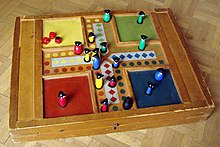Card games
Many sports require special equipment and dedicated playing fields, leading to the involvement of a community much larger than the group of players. A city or town may set aside such resources for the organization of sports leagues.

Popular sports may have spectators who are entertained just by watching games. A community will often align itself with a local sports team that supposedly represents it (even if the team or most of its players only recently moved in); they often align themselves against their opponents or have traditional rivalries. The concept of fandom began with sports fans.

Stanley Fish cited[citation needed] the balls and strikes of baseball as a clear example of social construction, the operation of rules on the game's tools. While the strike zone target is governed by the rules of the game, it epitomizes the category of things that exist only because people have agreed to treat them as real. No pitch is a ball or a strike until it has been labeled as such by an appropriate authority, the plate umpire, whose judgment on this matter cannot be challenged within the current game.
Certain competitive sports, such as racing and gymnastics, are not games by definitions such as Crawford's (see above) – despite the inclusion of many in the Olympic Games – because competitors do not interact with their opponents; they simply challenge each other in indirect ways.
Parcheesi is an American adaptation of a board game originating in India.
Board games use as a central tool a board on which the players' status, resources, and progress are tracked using physical tokens. Many also involve dice or cards. Most games that simulate war are board games (though a large number of video games have been created to simulate strategic combat), and the board may be a map on which the players' tokens move. Virtually all board games involve "turn-based" play; one player contemplates and then makes a move, then the next player does the same, and a player can only act on their turn. This is opposed to "real-time" play as is found in some card games, most sports and most video games.
Some games, such as chess and Go, are entirely deterministic, relying only on the strategy element for their interest. Such games are usually described as having "perfect information"; the only unknown is the exact thought processes of one's opponent, not the outcome of any unknown event inherent in the game (such as a card draw or die roll). Children's games, on the other hand, tend to be very luck-based, with games such as Candy Land and Chutes and Ladders having virtually no decisions to be made. By some definitions, such as that by Greg Costikyan, they are not games since there are no decisions to make which affect the outcome. Many other games involving a high degree of luck do not allow direct attacks between opponents; the random event simply determines a gain or loss in the standing of the current player within the game, which is independent of any other player; the "game" then is actually a "race" by definitions such as Crawford's.

Comments
Post a Comment